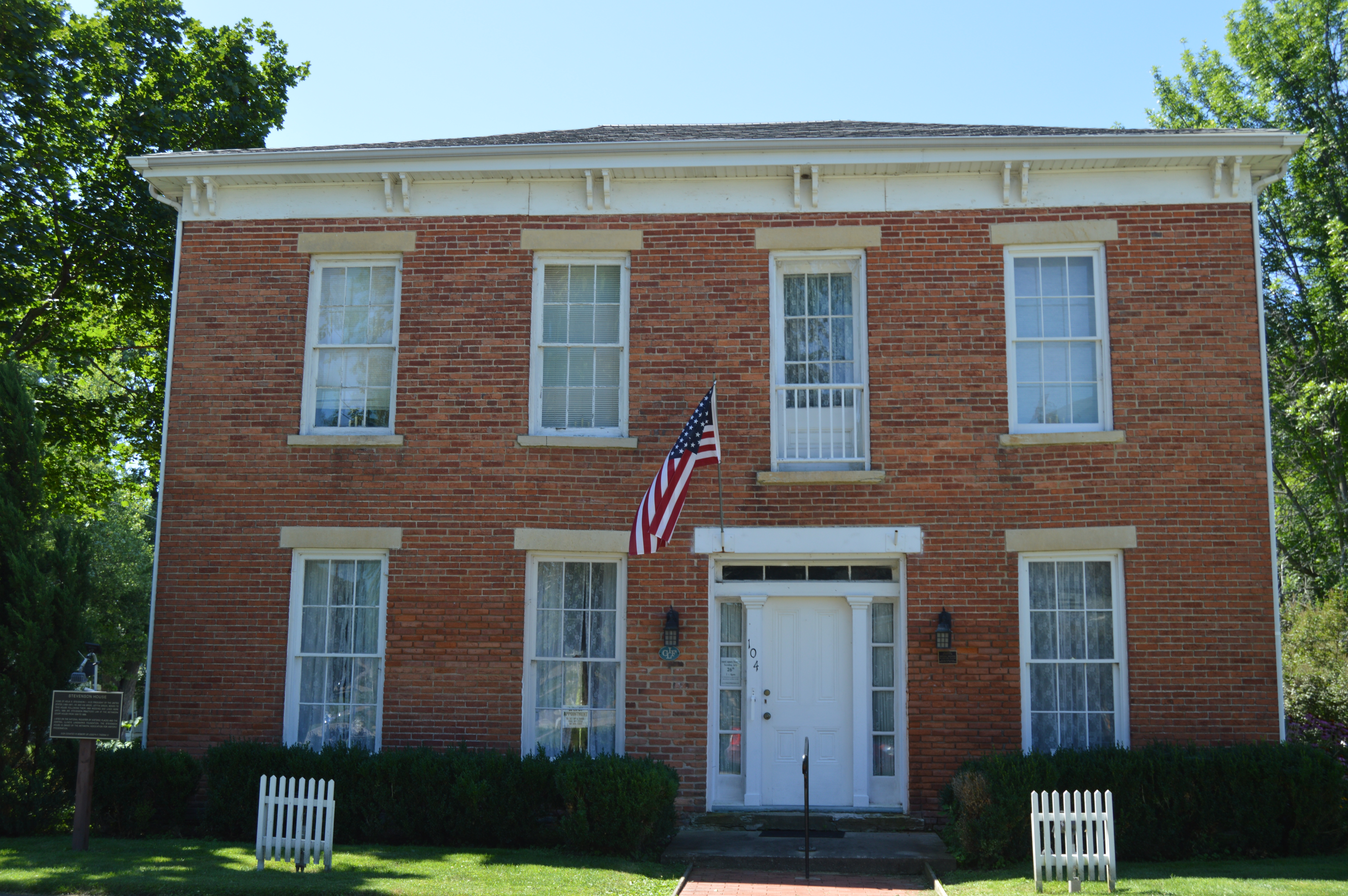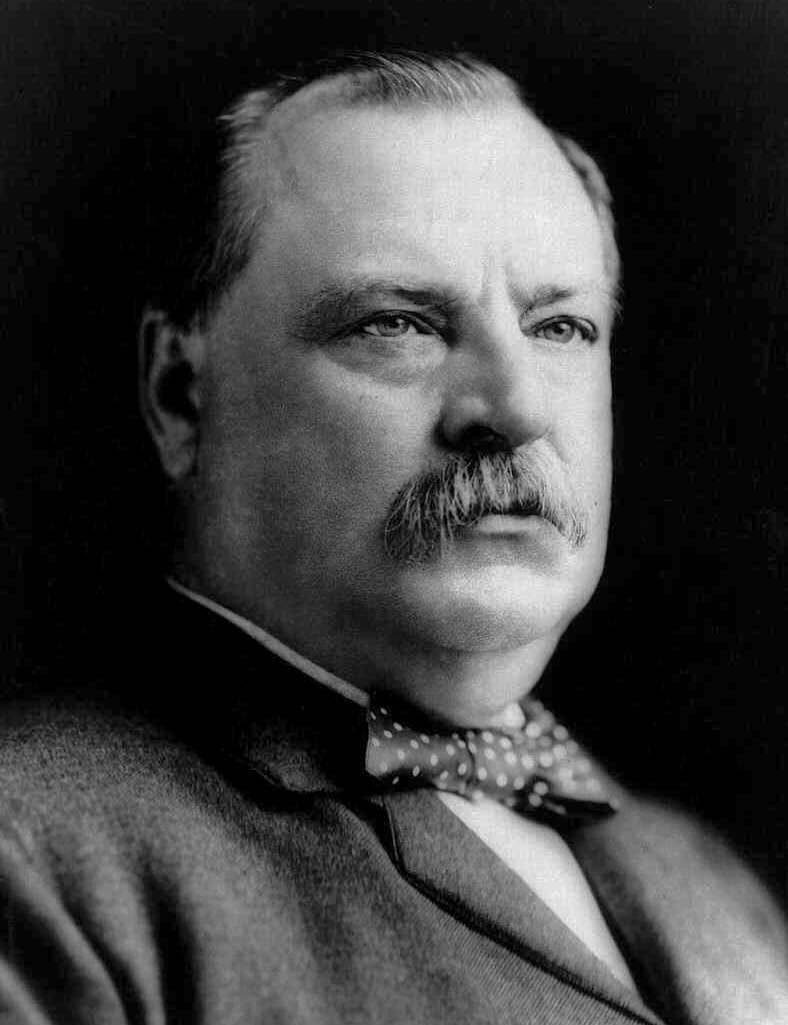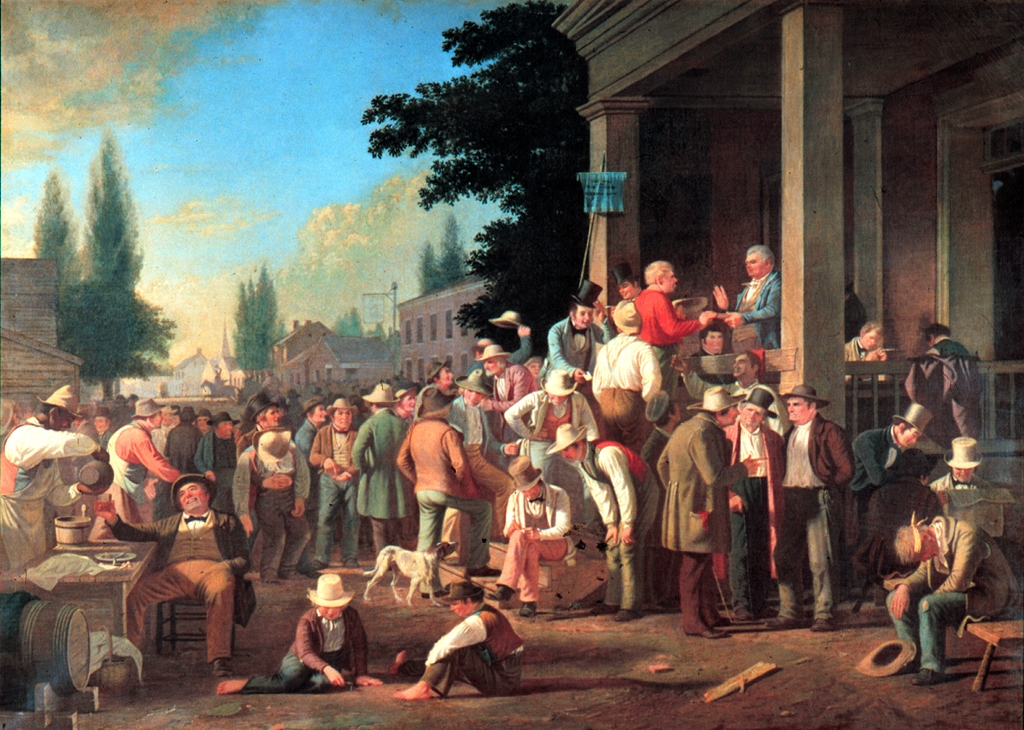|
President Cleveland
Stephen Grover Cleveland (March 18, 1837June 24, 1908) was an American lawyer and politician who served as the 22nd and 24th president of the United States from 1885 to 1889 and from 1893 to 1897. Cleveland is the only president in American history to serve two non-consecutive terms in office. He won the popular vote for three presidential elections—in 1884, 1888, and 1892—and was one of two Democrats (followed by Woodrow Wilson in 1912) to be elected president during the era of Republican presidential domination dating from 1861 to 1933. In 1881, Cleveland was elected mayor of Buffalo, and in 1882, he was elected governor of New York. He was the leader of the pro-business Bourbon Democrats who opposed high tariffs, free silver, inflation, imperialism, and subsidies to business, farmers, or veterans. His crusade for political reform and fiscal conservatism made him an icon for American conservatives of the era. Cleveland won praise for his honesty, self-reliance, ... [...More Info...] [...Related Items...] OR: [Wikipedia] [Google] [Baidu] |
Adlai Stevenson I
Adlai Ewing Stevenson (October 23, 1835 – June 14, 1914) was an American politician who served as the 23rd vice president of the United States from 1893 to 1897. He had served as a United States House of Representatives, U.S. Representative from Illinois in the late 1870s and early 1880s. After his appointment as assistant United States Postmaster General, postmaster general of the United States during Grover Cleveland's first administration (1885–1889), he fired many Republican postal workers and replaced them with Southern Democrats. This earned him the enmity of the Republican-controlled Congress, but made him a favorite as Grover Cleveland's running mate in 1892, and he was elected vice president of the United States. In office, he supported the free silver, free-silver lobby against the gold standard, gold-standard men like Cleveland, but was praised for governing in a dignified, non-partisan manner. In 1900, he ran for vice president with William Jennings Bryan. I ... [...More Info...] [...Related Items...] OR: [Wikipedia] [Google] [Baidu] |
Richard Falley Cleveland
Richard Falley Cleveland (June 19, 1804 – October 1, 1853) was an American Congregationalist and Presbyterian minister. A graduate of Yale College and Princeton Theological Seminary, he spent most of his life as a pastor, outside of a brief period as a district secretary for the American Home Missionary Society. He is best known as the father of Grover Cleveland, who was twice President of the United States. Early life Cleveland was born into an old-stock American family in Norwich, Connecticut, the son of Margaret (née Falley) and William Cleveland (a watchmaker by profession). His maternal grandfather, Richard Falley Jr., fought in the Battle of Bunker Hill. Cleveland's parents reputedly decided at his birth that their son would become a minister. Described as a "thin, pale, and intelligent boy" by Allan Nevins, he worked for periods at an uncle's cotton mill and as a store clerk before winning acceptance into Yale College. He graduated ''summa cum laude'' in 1824, and alm ... [...More Info...] [...Related Items...] OR: [Wikipedia] [Google] [Baidu] |
1884 United States Presidential Election
The 1884 United States presidential election was the 25th quadrennial presidential election, held on Tuesday, November 4, 1884. It saw the first Democrat elected President of the United States since James Buchanan in 1856, and the first Democratic president to hold office since Andrew Johnson, who assumed the presidency after the assassination of Abraham Lincoln. Governor Grover Cleveland of New York defeated Republican James G. Blaine of Maine. The election was set apart by unpleasant mudslinging and shameful personal allegations that eclipsed substantive issues, for example, civil administration change. It was a historically significant election, as Cleveland was the only Democratic president between Andrew Johnson, who left office in 1869, and Woodrow Wilson, who began his first term in 1913, representing a disruption of the period of Republican domination of the presidency between Reconstruction and the Great Depression. Cleveland won the presidential nomination on the seco ... [...More Info...] [...Related Items...] OR: [Wikipedia] [Google] [Baidu] |
Elections In The United States
Elections in the United States are held for Official, government officials at the Federal government of the United States, federal, State governments of the United States, state, and Local government in the United States, local levels. At the federal level, the nation's head of state, the President of the United States, president, is elected indirectly by the people of each U.S. state, state, through an United States Electoral College, Electoral College. Today, these electors almost always vote with the popular vote of their state. All members of the federal legislature, the United States Congress, Congress, are directly elected by the people of each state. There are many elected offices at state level, each state having at least an elective Governor (United States), governor and State legislature (United States), legislature. There are also elected offices at the local level, in County (United States), counties, cities, towns, townships, boroughs, and villages; as well as for ... [...More Info...] [...Related Items...] OR: [Wikipedia] [Google] [Baidu] |
President Of The United States
The president of the United States (POTUS) is the head of state and head of government of the United States of America. The president directs the executive branch of the federal government and is the commander-in-chief of the United States Armed Forces. The power of the presidency has grown substantially since the first president, George Washington, took office in 1789. While presidential power has ebbed and flowed over time, the presidency has played an increasingly strong role in American political life since the beginning of the 20th century, with a notable expansion during the presidency of Franklin D. Roosevelt. In contemporary times, the president is also looked upon as one of the world's most powerful political figures as the leader of the only remaining global superpower. As the leader of the nation with the largest economy by nominal GDP, the president possesses significant domestic and international hard and soft power. Article II of the Constitution establ ... [...More Info...] [...Related Items...] OR: [Wikipedia] [Google] [Baidu] |
Cross Of Gold Speech
The Cross of Gold speech was delivered by William Jennings Bryan, a former United States Representative from Nebraska, at the Democratic National Convention in Chicago on July 9, 1896. In his address, Bryan supported "free silver" (i.e. bimetallism), which he believed would bring the nation prosperity. He decried the gold standard, concluding the speech, "you shall not crucify mankind upon a cross of gold". Bryan's address helped catapult him to the Democratic Party's presidential nomination and is considered one of the greatest political speeches in American history. For twenty years, Americans had been bitterly divided over the nation's monetary standard. The gold standard, which the United States had effectively been on since 1873, limited the money supply but eased trade with other nations, such as the United Kingdom, whose currency was also based on gold. Many Americans, however, believed that bimetallism (making both gold and silver legal tender) was necessary for the nat ... [...More Info...] [...Related Items...] OR: [Wikipedia] [Google] [Baidu] |
William Jennings Bryan
William Jennings Bryan (March 19, 1860 – July 26, 1925) was an American lawyer, orator and politician. Beginning in 1896, he emerged as a dominant force in the History of the Democratic Party (United States), Democratic Party, running three times as the party's nominee for President of the United States in the 1896 United States presidential election, 1896, 1900 United States presidential election, 1900, and the 1908 United States presidential election, 1908 elections. He served in the United States House of Representatives, House of Representatives from 1891 to 1895 and as the United States Secretary of State, Secretary of State under Woodrow Wilson. Because of his faith in the wisdom of the common people, Bryan was often called "The Great Commoner", and because of his rhetorical power and early notoriety, "The Boy Orator". Born and raised in Illinois, Bryan moved to Nebraska in the 1880s. He won election to the House of Representatives in the 1890 United States House ... [...More Info...] [...Related Items...] OR: [Wikipedia] [Google] [Baidu] |
1892 United States Presidential Election
The 1892 United States presidential election was the 27th quadrennial presidential election, held on Tuesday, November 8, 1892. In a rematch of the closely contested 1888 presidential election, former Democratic President Grover Cleveland defeated incumbent Republican President Benjamin Harrison. Cleveland's victory made him the first and, to date, the only person in American history to be elected to a non-consecutive second presidential term. It was also the first time incumbents were defeated in consecutive elections—the second being Jimmy Carter's defeat of Gerald Ford in 1976, followed by Carter's subsequent loss to Ronald Reagan in 1980. Additionally, Harrison's loss marked the second time an elected president lost the popular vote twice, the first being John Quincy Adams in the 1820s. This feat was not repeated until Donald Trump lost the popular vote in 2016 and 2020. Though some Republicans opposed Harrison's re-nomination, Harrison defeated James G. Blaine and Wil ... [...More Info...] [...Related Items...] OR: [Wikipedia] [Google] [Baidu] |
Francis Cleveland
Francis Grover Cleveland (July 18, 1903 – November 8, 1995) was an American politician, stage actor, director and producer. He was the co-founder of the Barnstormers Theatre, a theatre company in Tamworth, New Hampshire. His parents were President Grover Cleveland and First Lady Frances Folsom. Early life Cleveland was born in 1903 in Buzzards Bay, Massachusetts, a part of the Town of Bourne. His father, Grover Cleveland, was the 22nd and 24th president of the United States; his mother, Frances Folsom, was First Lady. He had a brother, Richard, and three sisters, Ruth, Marion and Esther Cleveland was educated at the Phillips Exeter Academy and Harvard College. Career Cleveland became a stage actor in New York City. He played in ''Dead End'' by Sidney Kingsley and ''Our Town'' by Thornton Wilder on Broadway. With his wife Alice, and his producer Edward P. Goodnow, Cleveland co-founded the Barnstormers Theatre, a theatre company in Tamworth, New Hampshire in 1931. He directed m ... [...More Info...] [...Related Items...] OR: [Wikipedia] [Google] [Baidu] |
Richard F
Richard is a male given name. It originates, via Old French, from Old Frankish and is a compound of the words descending from Proto-Germanic ''*rīk-'' 'ruler, leader, king' and ''*hardu-'' 'strong, brave, hardy', and it therefore means 'strong in rule'. Nicknames include "Richie", "Dick", "Dickon", " Dickie", "Rich", "Rick", "Rico", "Ricky", and more. Richard is a common English, German and French male name. It's also used in many more languages, particularly Germanic, such as Norwegian, Danish, Swedish, Icelandic, and Dutch, as well as other languages including Irish, Scottish, Welsh and Finnish. Richard is cognate with variants of the name in other European languages, such as the Swedish "Rickard", the Catalan "Ricard" and the Italian "Riccardo", among others (see comprehensive variant list below). People named Richard Multiple people with the same name * Richard Andersen (other) * Richard Anderson (other) * Richard Cartwright (other) * Ri ... [...More Info...] [...Related Items...] OR: [Wikipedia] [Google] [Baidu] |
Esther Cleveland
Esther Cleveland (September 9, 1893 – June 25, 1980) was the second child of Grover Cleveland, 22nd and 24th President of the United States, and his wife Frances Folsom Cleveland. Biography She was born on September 9, 1893, in the White House. She remains the only child of a President to have been born there. Into her maturity, the US press still referred to her as "The White House baby" (in a photograph of her in her early 20s, from a now unknown newspaper archive source). In April 1896, she contracted measles when it spread through the White House, leading to a quarantine.Staff report (April 8, 1896). MEASLES IN THE WHITE HOUSE.; Esther Cleveland, the President's Daughter, Attacked by the Disease. ''The New York Times'' Five years later, she contracted diphtheria.Staff report (May 21, 1901). ESTHER CLEVELAND ILL.; Daughter of ex-President Attacked with Diphtheria -- Three Other Cases at Princeton. ''The New York Times'' She made her debut in 1912Staff report (1912?). MISS CL ... [...More Info...] [...Related Items...] OR: [Wikipedia] [Google] [Baidu] |
Ruth Cleveland
Ruth Cleveland (October 3, 1891 – January 7, 1904), popularly known as Baby Ruth, was the eldest of five children born to United States President Grover Cleveland and First Lady Frances Cleveland. Her birth between Cleveland's two terms of office caused a national sensation. Interest in her continued even after her father's second presidential term was over. A sickly child, Ruth Cleveland contracted diphtheria on January 2, 1904. Doctors thought her case was mild, but she died five days after her diagnosis. She is buried in Princeton Cemetery. In popular culture The Curtiss Candy Company asserted that the "Baby Ruth" candy bar (formerly known as Kandy Kake from 1900–1920) was named after Ruth Cleveland. The renaming of the candy bar took place in 1921, thirty years after Ruth Cleveland's birth and seventeen years after her death. That same year, legendary baseball player George Herman Ruth, better known by the nickname Babe Ruth, was nearing the top of his popularity, having ... [...More Info...] [...Related Items...] OR: [Wikipedia] [Google] [Baidu] |







